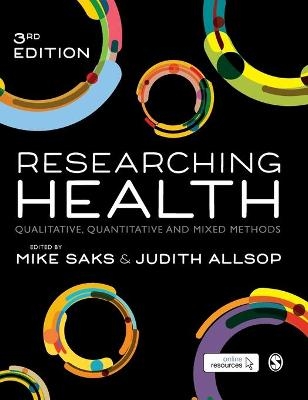
Researching Health
SAGE Publications Ltd (Verlag)
978-1-5264-2428-0 (ISBN)
Saks and Allsop′s Researching Health offers a comprehensive introduction to research methods for health care students and practitioners. The new third edition includes important theoretical updates, and further international content, with contributors from the UK, Italy, Japan, New Zealand, Portugal, Canada, and Spain, covering a number of specialisms and providing perspectives on core topics.
There are 6 NEW chapters on:
Principles of Health Research
Methods of Sampling in Qualitative Health Research
Qualitative Data Analysis and Health Research
Researching Health Care Management Using Secondary Data
Online Research in Health
Disseminating and Evaluating Health Research
The book is supported by case studies, end-of-chapter exercises, annotated further reading, and access to online resources for both students and lecturers, consisting of SAGE journal articles, web links, PowerPoint slides, and teaching notes for each chapter.
Professor Mike Saks is Research Professor at University Campus Suffolk (UCS), whose partners include the University of Essex and the University of East Anglia which are collaborating in the development of UCS. He studied at the University of Lancaster, University of Kent and the London School of Economics – at the latter of which he obtained a PhD in Sociology – and is a current Fellow of the Institute of Directors. He was formerly Senior Pro Vice Chancellor and Deputy to the Vice Chancellor at the University of Lincoln from 2002 to 2010, which enjoyed a steep rise in profile in this period. Before that he was Dean of the Faculty of Health and Community Studies at De Montfort University, where he was responsible for the education of a growing range of health and social care professions. He achieved a high internationally-rated profile in Politics and International Studies and Social Work and Social Policy & Administration in the 2001 and 2008 national Research Assessment Exercises respectively. He holds Visiting Chairs at the University of Essex and the University of Lincoln. Professor Saks has published extensively on professions, comparative healthcare and health research. He has also given many keynote presentations and papers at prestigious national/international conferences – as well as organised a number of these. In addition to numerous journal articles and book chapters, his books include: Alternative Medicine in Britain (1992), Professions and the Public Interest (1995), Health Professions and the State in Europe (1995), Professions, Identity and Order in Comparative Perspective (1998), Professional Identities in Transition (1999), Developing Research in Primary Care (2000), Complementary and Alternative Medicine: Challenge and Change (2000), Regulating the Health Professions (2002), Orthodox and Alternative Medicine: Professionalization, Politics and Health Care (2003), Researching Health; Qualitative, Quantitative and Mixed Methods (2007 first edition), and Rethinking Professional Governance: International Directions in Healthcare (2008). His latest books with Sage and Routledge respectively are: Researching Health: Qualitative, Quantitative and Mixed Methods (2012 second edition) and The Professions, State and the Market: A Comparative Analysis of Healthcare in Britain, the United States and Russia (2014). Professor Saks has been a member/chair of many NHS committees at all levels – covering areas from the changing healthcare workforce to research and development in primary care. He is currently a member of the Board of Suffolk NHS Primary Care Trust, having previously served on Committees of the East Midlands Strategic Health Authority and as the long term Chair of the East Midlands University Association Health and Social Care Group: He has also acted as an adviser to the NHS at national level. In 2000 he led the team that produced a commissioned report on health support workers for the UK Departments of Health and has subsequently advised the Department of Health and professional bodies such as the General Medical Council and the General Social Care Council on the regulation of health and social care professions. He is the previous Chair of the UK Human Tissue Bank and the Research Council for Complementary Medicine. Internationally, he has been involved in a number of funded research projects. He was a central participant in an INTAS-funded study of the changing attitudes of physicians in collaboration with the Russian Academy of Sciences – which surveyed some 600 Russian physicians. He recently collaborated with the University of Toronto on projects on care in the community, funded by the Canadian Institutes of Health Research. In addition, he is the current President and Chair of the Board of the International Sociological Association Research Committee on Professional Groups. He is also a member of the Board of the European Sociological Association Research Network on Professions and various International Advisory Boards of health and social science journals – as well as being an Editorial Board member for the Portuguese Journal of Social Science, Sociopedia and Current Sociology monographs. In recent years, she has investigated the dynamics of complaints and disputes in health care settings and received funding from the Economic and Social Research Council (ESRC), the Department of Health and local health authorities. She also carried out a study of the role of patient and carer groups in representing and promoting the interests of people with particular illnesses and conditions. This was funded by the ESRC.
Part I: Conducting Health Research
Chapter 1: Introduction to Researching Health - Mike Saks and Judith Allsop
Chapter 2: Principles of Health Research - Judith Allsop and Mike Saks
Chapter 3: Strategies for Health Research - Judith Allsop
Chapter 4: Doing a Literature Review in Health - Kathryn Jones
Part II: Qualitative Methods and Health
Chapter 5: Methods of Sampling in Qualitative Health Research - Lara Maestripieri, Arianna Radin and Elena Spina
Chapter 6: Using Documents in Health Research - Andy Alaszewski
Chapter 7: Unstructured and Semi-structured Interviews in Health Research - Jacqueline Low
Chapter 8: Participant Observation in Health Research - David Hughes
Chapter 9: The Use of Focus Groups in Health Research - Judith Green
Chapter 10: Action Research and Health - Heather Waterman
Chapter 11: Qualitative Data Analysis in Health Research - Miwako Hosoda
Part III: Quantitative Methods and Health
Chapter 12: Methods of Sampling in Quantitative Health Research - Nichola Shackleton, Martin Von Randow and Lara Greaves
Chapter 13: Quantitative Survey Methods in Health Research - Michael Calnan
Chapter 14: Randomized Controlled Trials - George Lewith and Paul Little
Chapter 15: Experimental Methods in Health Research - A. Niroshan Siriwardena
Chapter 16: The Use of Economics in Health Research - Steve Parrott and Alan Maynard
Chapter 17: Quantitative Data Analysis - George Argyrous
Chapter 18: Researching Health Care Management Using Secondary Data - Ian Kirkpatrick and Gianluca Veronesi
Part IV: Issues in Health Research
Chapter 19: Ethics in Health Research - Priscilla Alderson
Chapter 20: Identity and Health Research - Teresa Carvalho and Tiago Correia
Chapter 21: Public Involvement in Health Research - Anneliese Synnot
Chapter 22: Comparative Health Research - Viola Burau
Chapter 23: Interdisciplinary Research in Health Care - Paul Williams and Janet Lum
Chapter 24: Mixed Methods in Health Research - Jonathan Tritter
Chapter 25: Online Research in Health - Denis Anthony
Part V: Applying Health Research
Chapter 26: Health Research: Proposals, Planning and Writing Up - Judith Allsop and Mike Saks
Chapter 27: Disseminating and Evaluating Health Research - Mike Saks and Judith Allsop
| Erscheinungsdatum | 25.06.2019 |
|---|---|
| Verlagsort | London |
| Sprache | englisch |
| Maße | 186 x 232 mm |
| Gewicht | 1230 g |
| Themenwelt | Pflege ► Studiengänge ► Pflegewissenschaft |
| ISBN-10 | 1-5264-2428-2 / 1526424282 |
| ISBN-13 | 978-1-5264-2428-0 / 9781526424280 |
| Zustand | Neuware |
| Haben Sie eine Frage zum Produkt? |
aus dem Bereich


